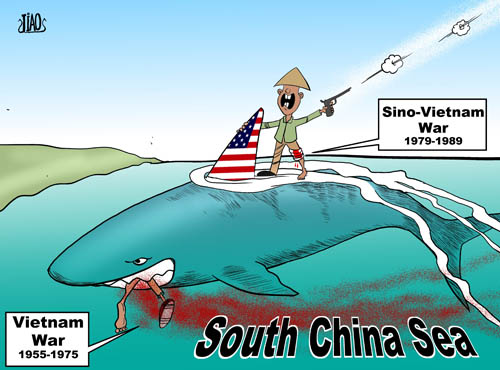Time of strength calls for calmer rhetoric
- By Tim Collard
 0 Comment(s)
0 Comment(s) Print
Print E-mail China.org.cn, June 30, 2012
E-mail China.org.cn, June 30, 2012
In a world still full of tensions, it is encouraging that South East Asia has recently been one of the more tranquil regions of the world. Apart from the uncertainties on the Korean peninsula, the Pacific Rim has remained largely pacific. However, we have been recently reminded that territorial disputes in the South China Sea still await a lasting solution.
|
|
|
Raw wounds [By Jiao Haiyang/China.org.cn] |
The official Chinese position on the competing territorial claims to the Nansha Islands remains constructive. Though China insists that these islands fall under Chinese sovereignty, the Chinese policy remains one of "putting aside disputes and seeking common development". No-one can deny that this is an entirely sensible policy. Territorial disputes should be subordinated, for the moment, to development; this is an unarguably rational position. The world knows China's position on sovereignty over the Nansha Islands; but it also knows that this position is not shared by all other countries, and that under UN rules each country has an equal voice. This issue should be resolved by means of international law. Meanwhile, all neighbouring countries should avoid raising the temperature.
This is why it is so disappointing to read of threatened confrontations in the region; in particular the dispute with the Philippines over Huangyan Island in the Nansha group. At the end of May the China Daily ran an article by Mr Chu Zhaogen ("The Philippines must stop running amok"), which, by means of some rather unfortunate and inflammatory language attacked the Philippines over this issue.
I do not defend the harassment of Chinese fishermen in the area, which seems to be a senseless act of provocation. But, Mr Chu's claim that "with the United States as the puppeteer behind the scenes, Vietnam and the Philippines have chosen to rebuff China's friendly intentions" is, I think, going too far. In the same article he also claims "the US wants to create discord and chaos in the region so as to sell arms and stimulate its economic recovery". Now, this is inflammatory language. It is Cold War language. And surely the very last thing the world needs is another Cold War.
I know that Mr Chu's article does not necessarily represent official Chinese policy; a recent statement by a Foreign Ministry spokesman was certainly more moderately worded. But it is clear that some currents of official opinion in China are more hard-line, and I would like to examine the historical background of this phenomenon.
When I worked as a diplomat in China 20 years ago, it seemed that China felt itself undervalued and not taken sufficiently seriously by the West; this was understandable, given the fact that China has only relatively recently re-emerged as a world power. And thus the Chinese government developed a set of fairly prickly reactions to anything which was seen as a challenge or a provocation. As a result, a fixed pattern of sharp responses became established, in answer to anything which looked like a potential threat to sovereignty or territorial integrity, or any sign that another country was giving too much honor and consideration to an individual of whom the Chinese government disapproved. These responses have continued largely unchanged into the present; this, I guess, is because diplomats like me were carefully monitoring the precise wording of official statements, looking out for change; and the Chinese leadership feared lest any relaxation might be interpreted as weakness.
But times have changed, and China's position in the world has become steadily stronger. For instance, relations across the Taiwan Straits have become much more peaceful and constructive. Taiwan has shown less and less inclination to engage in provocative pro-independence gestures, and both sides have clearly seen that relaxing the rhetoric in favour of increasing economic cooperation and integration is the way forward. In the same way, China needs no longer fear "intimidation" by her neighbours. The Philippines are not foolish enough to think they can intimidate China. Even the United States can't do that, and doesn't want to; still less would the US wish to egg on its regional allies to engage in irresponsible and dangerous provocations. If the Philippine government thinks it can "intimidate China by leaning on the US," it has badly misunderstood both China and the US. I don't believe President Aquino is that foolish. President Obama certainly is not.
The idea that the US, or the West in general, wants to see a weak or humiliated China belongs firmly to the past, if it were ever true. China is an essential part of the global security and economic structure. The last thing an already overstretched America wants is more instability in the world than exists already. The world needs and welcomes a strong China; and, now that China is strong, perhaps her spokesmen can relax some of the aggressive rhetoric which was adopted in a time of relative weakness.
The author is a retired British diplomat who spent most of his career in China and Germany. He writes a regular blog on the Daily Telegraph website.
Opinion articles reflect the views of their authors, not necessarily those of China.org.cn







Go to Forum >>0 Comment(s)